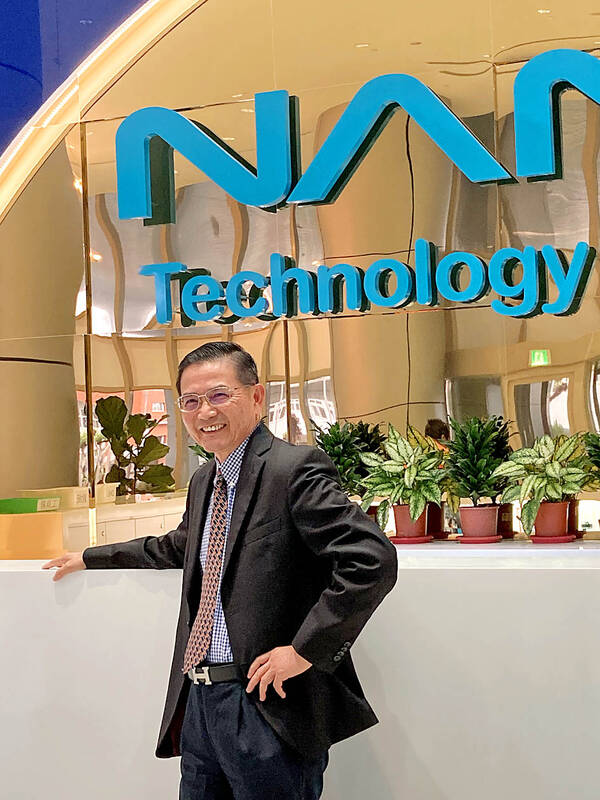DRAM chipmaker Nanya Technology Corp (南亞科技) yesterday said chip prices might stabilize next quarter, as improving inventory along the supply chain and industrywide production cuts have yielded initial results.
“We are feeling a slight [improvement],” company president Lee Pei-ing (李培瑛) said in response to a reporter’s question about the latest market conditions compared with last month.
“This is not extensive, but a gradual [pickup]. It is moving in a positive direction,” Lee said.

Photo: Lisa Wang, Taipei Times
The mild improvement is driven by a combination of factors including easing inventory pressure and smaller chip supply, Lee said.
TV demand also bounced back lately, he said.
To cope with sagging chip demand, Nanya Technology is adjusting its factory utilization within a range of 20 percent as previously planned, he said.
South Korean rivals Samsung Electronics Co and SK Hynix Inc also unveiled plans to scale down production to prevent a supply glut and falling memorychip prices eating into their profitability.
The DRAM industry has been in a correction cycle for more than a year. Last year, DRAM prices plummeted 40 percent from the previous year, market researcher TrendForce Corp (集邦科技) has said.
With the electronics industry’s peak season arriving in the second half, Nanya Technology expects seasonal demand to help buoy memorychip prices.
PC demand is expected to improve in the third and fourth quarters, compared with the first half of this year, Lee said.
Asked about the effects of China’s restrictions on using Micron Technology Inc memory chips in servers and data centers due to national security concerns, Nanya Technology said it would closely monitor how the restrictions play out.
It is too early to say whether Nanya Technology would benefit from the curbs as some have speculated, as geopolitical issues are complicated, Lee said.
The company has not received any requests from customers to fill the void in supply left by Micron, he said.
Nanya has learned that some companies in China are concerned about being requested to abandon components made by US suppliers, Lee said.
Customers are closely monitoring how geopolitical tensions would affect their component procurement strategy, he said.
China accounts for about 20 percent of Nanya Technology’s revenue, Lee said.

CAUTIOUS RECOVERY: While the manufacturing sector returned to growth amid the US-China trade truce, firms remain wary as uncertainty clouds the outlook, the CIER said The local manufacturing sector returned to expansion last month, as the official purchasing managers’ index (PMI) rose 2.1 points to 51.0, driven by a temporary easing in US-China trade tensions, the Chung-Hua Institution for Economic Research (CIER, 中華經濟研究院) said yesterday. The PMI gauges the health of the manufacturing industry, with readings above 50 indicating expansion and those below 50 signaling contraction. “Firms are not as pessimistic as they were in April, but they remain far from optimistic,” CIER president Lien Hsien-ming (連賢明) said at a news conference. The full impact of US tariff decisions is unlikely to become clear until later this month

With an approval rating of just two percent, Peruvian President Dina Boluarte might be the world’s most unpopular leader, according to pollsters. Protests greeted her rise to power 29 months ago, and have marked her entire term — joined by assorted scandals, investigations, controversies and a surge in gang violence. The 63-year-old is the target of a dozen probes, including for her alleged failure to declare gifts of luxury jewels and watches, a scandal inevitably dubbed “Rolexgate.” She is also under the microscope for a two-week undeclared absence for nose surgery — which she insists was medical, not cosmetic — and is

GROWING CONCERN: Some senior Trump administration officials opposed the UAE expansion over fears that another TSMC project could jeopardize its US investment Taiwan Semiconductor Manufacturing Co (TSMC, 台積電) is evaluating building an advanced production facility in the United Arab Emirates (UAE) and has discussed the possibility with officials in US President Donald Trump’s administration, people familiar with the matter said, in a potentially major bet on the Middle East that would only come to fruition with Washington’s approval. The company has had multiple meetings in the past few months with US Special Envoy to the Middle East Steve Witkoff and officials from MGX, an influential investment vehicle overseen by the UAE president’s brother, the people said. The conversations are a continuation of talks that

CHIP DUTIES: TSMC said it voiced its concerns to Washington about tariffs, telling the US commerce department that it wants ‘fair treatment’ to protect its competitiveness Taiwan Semiconductor Manufacturing Co (TSMC, 台積電) yesterday reiterated robust business prospects for this year as strong artificial intelligence (AI) chip demand from Nvidia Corp and other customers would absorb the impacts of US tariffs. “The impact of tariffs would be indirect, as the custom tax is the importers’ responsibility, not the exporters,” TSMC chairman and chief executive officer C.C. Wei (魏哲家) said at the chipmaker’s annual shareholders’ meeting in Hsinchu City. TSMC’s business could be affected if people become reluctant to buy electronics due to inflated prices, Wei said. In addition, the chipmaker has voiced its concern to the US Department of Commerce